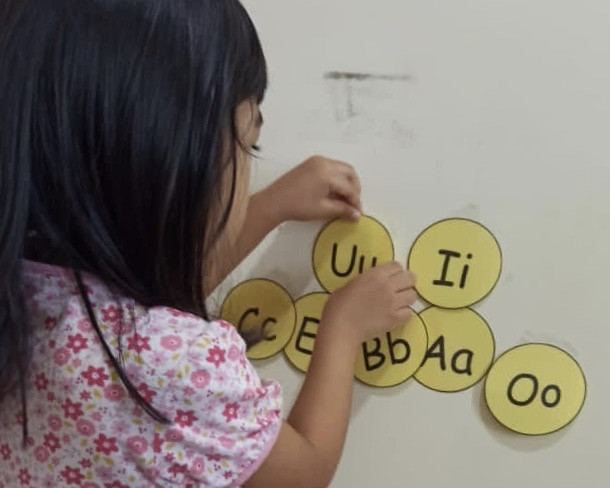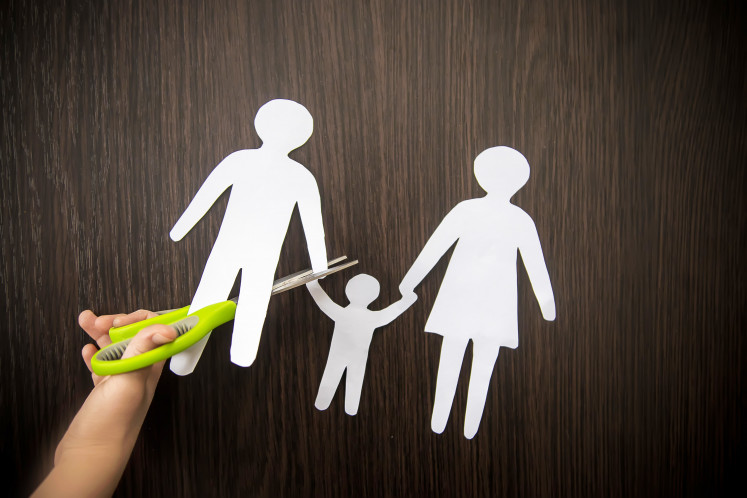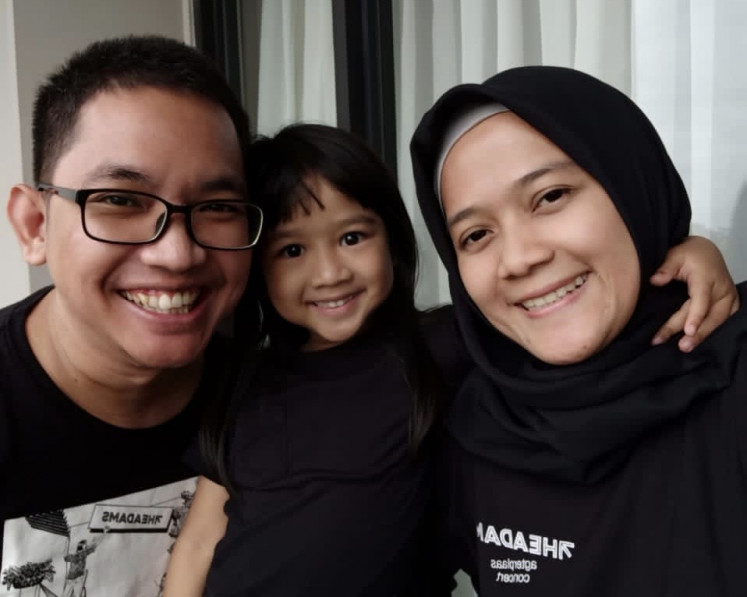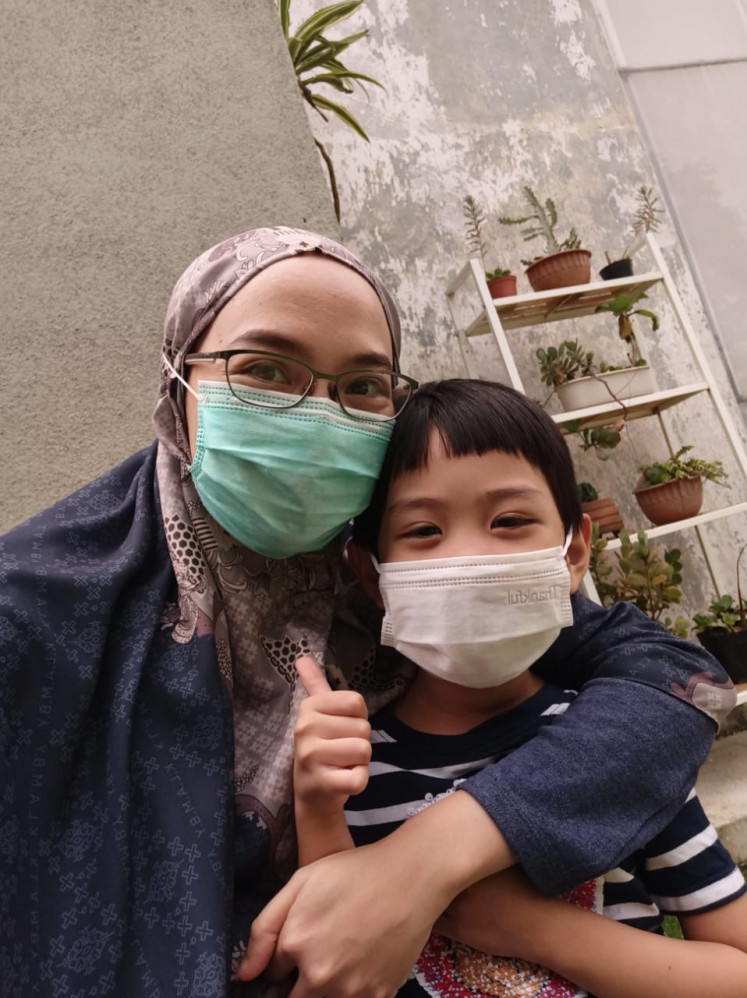Popular Reads
Top Results
Can't find what you're looking for?
View all search resultsPopular Reads
Top Results
Can't find what you're looking for?
View all search resultsOnline learning & burnout: Why some parents are keen for their children to go back to school
The method has left many parents feeling burned out and dissatisfied, who are concerned about both the benefits and risks of resuming in-class learning as the government pushes to reopen schools.
Change text size
Gift Premium Articles
to Anyone
Online schooling meant many adjustments for Maria Ferrari’s daughters, 7-year-old Senja and 11-year-old Tala.
In the early days of at-home learning, Maria was worried about the method’s reliance on digital devices, since she allowed her youngest daughter to use them only on weekends. After a few months of lending Senja her laptop, Maria and her husband bought a new laptop for their daughter.
But then, the 43-year-old mother found that Senja was becoming increasingly distracted by the internet, whether it was chatting with her friends or watching videos on YouTube.
Theoretically, the offline hour after each class was to be used for other activities that did not use gadgets, but Maria said that her daughters found it increasingly difficult to unplug.
“At school, [Senja and Tala] can play with their friends during recess. Now that they’re apart from each other, they stay connected through the internet,” she said. Classes like physical education were also challenging, with limited space at home.
The lack of physical activity in online learning is a worry some parents share.
Fanni Yudharisman, a 32-year-old entrepreneur and mother to 4-year-old Gita, said she tried to make up for it by taking her daughter “to an indoor playground in our building or riding bicycles in the area after classes”.
“In regular school, the children could perform gross motor skills [activities] before class, like playing on the swings or slides. When it’s time for them to sit down to practice their fine motor skills, the child should be more focused” because they had spent their excess energy, Fanni explained.
Gita (center), poses with her mother, Fanni, and father. Fanni is concerned about providing a "normal" learning experience for her 4-year-old, who has yet to begin school. (JP/Courtesy of subject)More duties and burnout
The challenge is a little different for Ratu Mirza Jatradijaya, a 32-year-old employed at a state-owned enterprise. Her 5-year-old son Raya depends on her to help him with his online studies, but she also needs to go to the office thrice a week. While Mirza and Raya live in Bandung, her husband works almost 100 kilometers away in Karawang, although both regions are located in West Java.
“On days when I’m in the office, Raya wouldn’t attend his online school. Even when I work at home, I still need to balance work and [helping] Raya in his classes,” said Mirza. When she can’t be with him, Raya’s maternal grandmother and great aunt help him, but he often skips classes under their care.
“I feel that children of Raya’s age associate home as a comfort zone where they play with their parents, watch television or just lounge around,” Mirza said. “It’s not fun for them to study online at home without [being around] their friends.”
She also felt that the role of mothers had expanded significantly in the past year: “Mothers are expected to do domestic work while also taking on the role of a teacher. For working mothers, it’s even more difficult to balance our responsibilities.”
It also seemed that both children parents and children were more prone to burnout. Maria said it was getting more difficult to keep up with how her preteen daughter thought and felt, especially since adolescents were more emotionally complex than younger children.
Fanni and Mirza both said they had observed their children getting upset more frequently since online learning began, and that this had led to increased tension between them and their children.
School reopenings
The women agree that online schooling has been less than ideal in many ways and the fact that it has been going on for more than a year had made their children less motivated. Like most parents, however, they are aware of the health risks of resuming in-class learning.
Read also: Government pushes for school reopening
Maria said that around last December, her children’s school sent out a survey on whether parents supported resuming offline classes.
“My eldest daughter hoped I would agree, but as the number of COVID cases were very high, I was worried about my children’s safety,” said Maria. But she was warming to the idea “now that Senja and Tala are less and less motivated to study”.
While she still had the same concerns, Maria said she would be open to resuming in-class learning if all staff was vaccinated and the school implemented strict health protocols.
“I now feel that the children’s mental health are more important to me. If they’re happy, their immune systems will be stronger. What we can do [as parents] is to prepare them as best as we can, provide them with balanced nutrition, vitamin supplements and so on. I leave the rest to God,” she said.
Maria’s husband Chris Holm, a 49-year-old consultant, agreed with her.
“Our eldest daughter has suffered from anxiety and low-level depression because of a lack of contact with her peers. I think the school we go to has been coping with it as best as they can, and I don't have any big problems with the school at all. I just hope that [our daughters] can go back to [in-class learning] as soon as possible,” he said.
“As a friend of mine put it, 'now the malls are filling up again, but our kids are still not at school,’” Holm added.
Fanni, who wanted Gita to have a “normal" learning experience, opted to enroll her in a twice weekly math and reading course for the next semester.
As this would be the first time for the 4-year-old to attend a physical school, Fanni felt it was a safe alternative in providing a classroom learning environment.
“What’s certain is that every child is hoping that they can go back to school soon. [This hope] is fading slowly with the uncertainty of when the pandemic will end,” said Maria. “It’s like a marathon with no clear finish line.”














